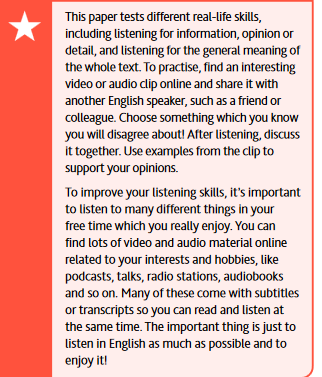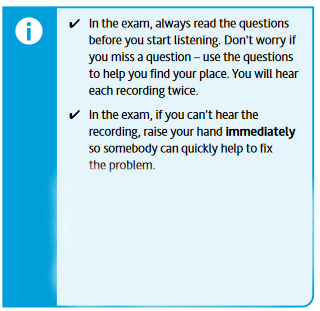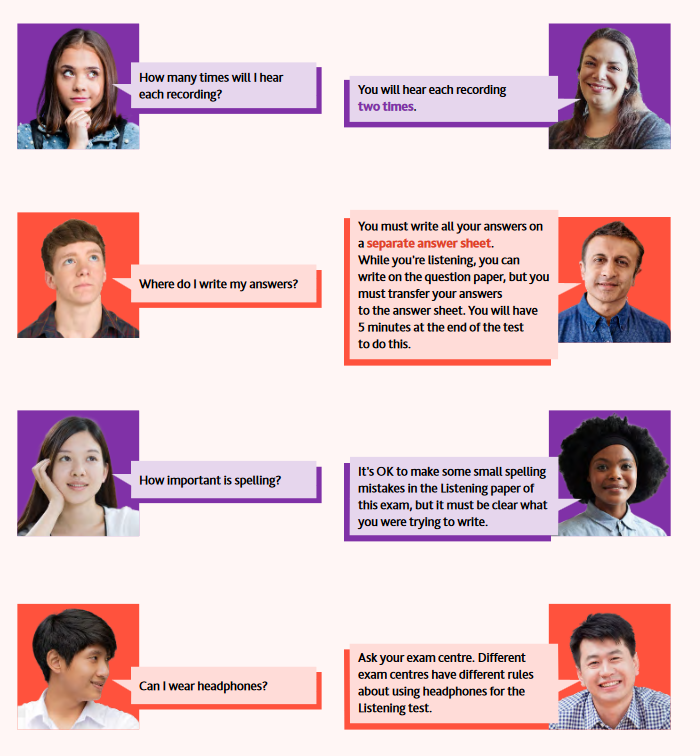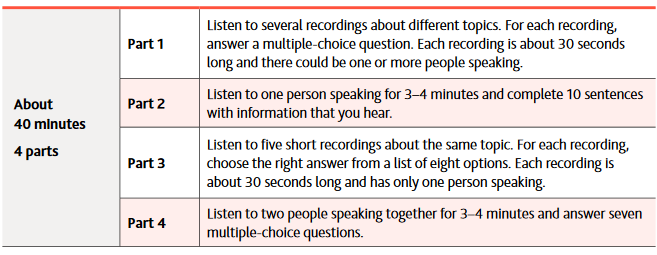-
FCE- Introduction
-
First (FCE) Exam: General OverviewLecture1.1
-
Computer Based Exam TutorialLecture1.2
-
The Cambridge English Scale: ResultsLecture1.3
-
FCE Score: How to calculateLecture1.4
-
Preparing for the exam: What should you know?Lecture1.5
-
-
Paper 1- Reading and Use of English
-
Introduction to the Reading and Use of English section of the FCE examLecture2.1
-
Developing reading skills: skimming, scanning, and reading for detailLecture2.2
-
General Information and Tips- Reading and Use of English- Paper 1Lecture2.3
-
Tips: Part 7- Multiple Matching- Reading and Use of EnglishLecture2.4
-
Practice Part 7-Multiple Matching- Reading and Use of EnglishLecture2.5
-
Tips Part 4-Key Word Transformation- Reading and Use of EnglishLecture2.6
-
More Tips Part 4- Key Word Transformation- Reading and Use of EnglishLecture2.7
-
Practice Part 4- Key Word Transformations- Reading and Use of EnglishLecture2.8
-
Tips Part 6- Gapped Text- Reading and Use of EnglishLecture2.9
-
Practice Part 6- Gapped Text- Reading and Use of EnglishLecture2.10
-
Tips Part 3-Word Formation- Reading and Use of EnglishLecture2.11
-
Practice Part 3- Word Formation-Reading and Use of EnglishLecture2.12
-
Tips Part 5- Multiple Choice- Reading and Use of EnglishLecture2.13
-
Practice Part 5- Multiple Choice- Reading and Use of English-Lecture2.14
-
Tips Part 1- Multiple Choice Cloze- Reading and Use of EnglishLecture2.15
-
More Tips Part 1- Multiple Choice Cloze- Reading and Use of EnglishLecture2.16
-
Practice Part 1- Multiple Choice Cloze- Reading and Use of English-Lecture2.17
-
Tips Part 2- Open Cloze- Reading and Use of EnglishLecture2.18
-
More Tips Part 2- Open Cloze- Reading and Use of EnglishLecture2.19
-
Practice Part 2- Open Cloze- Reading and Use of EnglishLecture2.20
-
General Overview and Tips- Reading and Use of EnglishLecture2.21
-
General Review- Reading and Use of EnglishLecture2.22
-
Paper 1 Practice- Reading and Use of EnglishLecture2.23
-
More Tips and Practice- Part 1- Multiple Choice Cloze-Reading and Use of EnglishLecture2.24
-
More Practice- Part 1- Multiple Choice Cloze- Reading and Use of EnglishLecture2.25
-
More Practice- Part 1- Multiple Choice Cloze- Reading and Use of EnglishLecture2.26
-
More Practice- Part 1- Multiple Choice Cloze- Reading and Use of EnglishLecture2.27
-
More Tips and Practice- Part 2- Open Cloze- Reading and Use of EnglishLecture2.28
-
More Tips and Practice- Part 3- Word Formation- Reading and Use of EnglishLecture2.29
-
More Tips and Practice- Part 4-Key Word Transformation-Reading and Use of EnglishLecture2.30
-
More Practice- Part 4- Key Word Transformation- Reading and Use of EnglishLecture2.31
-
More Practice- Part 4- Key Word Transformation- Reading and Use of EnglishLecture2.32
-
More Practice- Part 4- Key Word Transformation- Reading and Use of EnglishLecture2.33
-
More Tips and Practice- Part 5- Multiple Choice- Reading and Use of EnglishLecture2.34
-
More Practice- Part 5- Multiple Choice- Reading and Use of EnglishLecture2.35
-
More Tips and Practice- Part 6- Gapped Text- Reading and Use of EnglishLecture2.36
-
More Practice- Part 6- Gapped Text- Reading and Use of EnglishLecture2.37
-
More Tips and Practice- Part 7- Multiple Matching- Reading and Use of EnglishLecture2.38
-
Protegido: Sample Paper Test- Reading and Use of English 01 hour 15 minLecture2.39
-
-
Grammar
-
Dynamic vs Stative Verbs- MN Video- Listening- Grammar FocusLecture3.1
-
Dynamic vs Stative Verbs – Quiz – Practice Focus 10 questionsQuiz3.1
-
Verb + Gerund- Reading and Writing- Grammar FocusLecture3.2
-
Verb + Infinitive- Reading and Writing- Grammar FocusLecture3.3
-
Verb + Gerund/Infinitive- Reading and Writing- Grammar FocusLecture3.4
-
Verb + Gerund/Infinitive- Reading and Writing- Grammar FocusLecture3.5
-
The Use of Articles (a/an/the)- Reading and Writing- Grammar FocusLecture3.6
-
-
Vocabulary
-
Vocabulary development and strategies for word formation and collocationsLecture4.1
-
Vocabulary- Learning TipsLecture4.2
-
Collocations- Part 1Lecture4.3
-
Collocations- Part 2Lecture4.4
-
Collocations- Part 3Lecture4.5
-
Collocations- Part 4Lecture4.6
-
Collocations- Part 5Lecture4.7
-
Prefixes and Suffixes- Part 1Lecture4.8
-
Word Formation -“-ed” vs “-ing”Lecture4.9
-
Phrasal Verbs (1): meanings and typesLecture4.10
-
Phrasal Verbs (2): SeparabilityLecture4.11
-
-
Paper 2- Writing
-
Writing- Preparing for the examLecture5.1
-
Writing- Some Common QuestionsLecture5.2
-
Writing- Dos and Don’tsLecture5.3
-
Writing- How is FCE Writing Scored?Lecture5.4
-
Informal Letter/Email- Writing GuideLecture5.5
-
Informal Email/Letter- Sample and TipsLecture5.6
-
Informal Letter or Email-Tips/Sample questions and answersLecture5.7
-
Informal Email/Letter- Sample and PracticeLecture5.8
-
Formal Email/Letter – Steps to WritingLecture5.9
-
Letter of Application- Writing GuideLecture5.10
-
Letter of Application- Understanding and ModelLecture5.11
-
Letter of Application- Sample and PracticeLecture5.12
-
Letter of Application-Writing Topics- PracticeLecture5.13
-
Formal and Semi-formal Letter/ Email- Tips and SamplesLecture5.14
-
Email/Letter General Writing GuideLecture5.15
-
Article- Steps to WritingLecture5.16
-
Article- Writing Guide,Tips and Sample Questions and AnswersLecture5.17
-
Article- How to Write an Article- VideoLecture5.18
-
Article- Writing Topics- PracticeLecture5.19
-
Essay- Writing GuideLecture5.20
-
Writing Essays for the FCE- Types and OrganizationLecture5.21
-
Essay- Writing Guide, Tips and Sample Questions and AnswersLecture5.22
-
Essay- Tips and SamplesLecture5.23
-
Essay- Samples,Tips, and PracticeLecture5.24
-
Review- Writing Guide, Tips, and Sample Questions and AnswersLecture5.25
-
Review- Steps to Writing and TipsLecture5.26
-
Review- Tips and SampleLecture5.27
-
Review- Tips and SampleLecture5.28
-
Review- Sample Questions- PracticeLecture5.29
-
Report- First Steps to Writing a ReportLecture5.30
-
Report- Writing GuideLecture5.31
-
Report- Writing Sample Questions-PracticeLecture5.32
-
Writing-10 B2 First Writing Exam TipsLecture5.33
-
Writing- B2 First Writing ChecklistLecture5.34
-
Protegido: Writing- B2 First Writing Sample Paper Test Parts 1 and 2 01 hour 20 minLecture5.35
-
Writing Essays- 5 most common mistakesLecture5.36
-
-
Paper 3- Listening
-
FCE Listening- Introduction and General TipsLecture6.1
-
FCE Listening- Do’s and Dont’sLecture6.2
-
FCE Listening Tips- Part 1- Multiple ChoiceLecture6.3
-
Listening Practice- Part 1- Multiple ChoiceLecture6.4
-
Listening Practice- Part 1- Multiple ChoiceLecture6.5
-
Listening Practice- Part 1- Multiple ChoiceLecture6.6
-
FCE Listening Tips- Part 2- Sentence CompletionLecture6.7
-
Listening Practice- Part 2- Sentence CompletionLecture6.8
-
Listening Practice- Part 2- Sentence CompletionLecture6.9
-
Listening Practice- Part 2- Sentence CompletionLecture6.10
-
FCE Listening Tips- Part 3- Multiple MatchingLecture6.11
-
Listening Practice- Part 3- Multiple MatchingLecture6.12
-
Listening Practice- Part 3- Multiple MatchingLecture6.13
-
Listening Practice- Part 3- Multiple MatchingLecture6.14
-
Listening Practice- Part 3- Multiple MatchingLecture6.15
-
FCE Listening Tips- Part 4- Multiple ChoiceLecture6.16
-
Listening Practice- Part 4- Multiple ChoiceLecture6.17
-
Listening Practice- Part 4- Multiple ChoiceLecture6.18
-
Listening Practice- Part 4- Multiple ChoiceLecture6.19
-
Protegido: Listening- Sample Paper Test 1Lecture6.20
-
Protegido: Listening- Sample Paper Test 2Lecture6.21
-
-
Paper 4- Speaking
-
Varieties of EnglishLecture7.1
-
Speaking- Preparing for the examLecture7.2
-
Speaking- Some More TipsLecture7.3
-
Speaking- Some Common QuestionsLecture7.4
-
Speaking- Do’s and Don’tsLecture7.5
-
Speaking- Examiners CommentsLecture7.6
-
Speaking- Exam AssessmentLecture7.7
-
Speaking Part 2- Exam Tips and PracticeLecture7.8
-
Speaking Part 2- PracticeLecture7.9
-
Speaking Part 2- PracticeLecture7.10
-
Speaking Part 3- Exam Tips and PracticeLecture7.11
-
Speaking Parts 3 and 4-Exam Tips and PracticeLecture7.12
-
Speaking Part 1- Exam Tips and PracticeLecture7.13
-
Speaking Part 1- PracticeLecture7.14
-
Speaking Part 1- PracticeLecture7.15
-
Speaking Exam ReviewLecture7.16
-
Speaking Test PracticeLecture7.17
-
-
Topic Related Activities
FCE Listening- Introduction and General Tips
The Cambridge B2 First listening test has 4 parts, 30 questions, and takes about 40 minutes.
You normally do this after the Reading and Writing tests, so you might be quite tired before the listening test even begins. Every recording is played twice, but you will have to concentrate hard both times.
Bellow are some general tips.
1. BEFORE THE EXAM
-
Make sure you know what to expect in each part of the exam.
-
Listen to English! There are billions of free videos, presentations, radio shows, podcasts, etc, that you can listen to.
-
Accents – you will hear some standard British and American accents in the exam, but you might also hear Australian, South African, Irish, Scottish… Try to listen to a variety of accents to give you a good chance of understanding everyone.
-
Ages – the speakers will range from teenagers to the elderly – so again, make sure you’re listening to a variety of types of people. Oh, and don’t only listen to men, or only women.
-
Practice listening and writing at the same time! Many of my students complain that they can’t listen AND write. But they can – they just need to practice a few times.
-
Learn from your mistakes. If you take some practice tests don’t just say ‘I got 23 out of 40’. Focus on the ones you got wrong and try to work out WHY you got them wrong. Read the transcripts. Listen again and again until you understand why the answer is the answer and why your answer is the wrong answer. Investing 20 minutes in this activity will have a huge impact!
2. IN THE EXAM
 Time management is a way to give yourself an advantage over other students. I know it’s not a competition, but it TOTALLY IS A COMPETITION. Some students who take the exam don’t do ANY preparation, if you can believe it. So at the start of every section Cambridge have to tell everybody what to do. So while the other students are listening to that explanation, you can start reading the questions in the next section already.
Time management is a way to give yourself an advantage over other students. I know it’s not a competition, but it TOTALLY IS A COMPETITION. Some students who take the exam don’t do ANY preparation, if you can believe it. So at the start of every section Cambridge have to tell everybody what to do. So while the other students are listening to that explanation, you can start reading the questions in the next section already.
Don’t get cocky – you might be 100% sure that your answer is right and think you don’t have to listen when the recording is played the second time. All I have to say about that is that Napoleon was 100% sure it was a good idea to invade Russia in winter, so listen twice and check for possible mistakes.
Use whatever time you have to read the questions, underline keywords, and PREDICT possible answers. Guessing the answer before you listen is really helpful – just bear in mind that the answer you chose might be a distractor.
3. DISTRACTORS, LINKERS, AND OTHER CAMBRIDGE FAVOURITES
Imagine a listening test where you hear a voice saying ‘I have an apple, a banana, and a carrot in my backpack’ and your job is to answer the following question:
What does the speaker have in his backpack?
a] sloth, cushion, basket
b] apple, banana, carrot
c] egg, bacon, lettuce
It’s quite easy, right? Well I’ve got some bad news for you. Cambridge will never, ever, give you a question this easy.
Instead, they will mention ALL of the answers.
This morning I ate a bacon and lettuce sandwich with some sliced egg, and then I went to my job at the zoo where it’s my job to make sure the sloths have enough cushions and baskets. I’m on my way to the monkey cages now so I’ve got a few apples and carrots for them. Oh, and a banana, as you can see poking out of my rucksack.
See that ALL the phrases in a, b, and c were mentioned? Let’s look at them more closely:
a] It’s the speaker’s JOB to give cushions and baskets to the sloths. The question is ‘what does he have in his backpack?’ Meaning right now, and he doesn’t say that he has a cushion in his backpack. And he wouldn’t carry sloths around in a backpack – he knows sloths prefer to be carried in buckets.
Remember, he didn’t SAY that he had those things in his backpack and you can’t ASSUME that he does.
b] He mentions that he has some apples and carrot for the monkeys, and that a banana is sticking out of his rucksack, which is a synonym for backpack. So this is clearly the right answer. Let’s just check c before we write anything down.
c] He had egg, bacon, and lettuce for breakfast – it’s not in his backpack.
So that’s a basic introduction to DISTRACTORS. What about LINKERS?
Linkers are another way Cambridge try to distract you. Here I’m thinking of phrases like ‘whereas’, ‘although’, ‘however’ – all those phrases your English teacher tries to get you to use!
What sandwich did the man have for lunch?
a] bacon and lettuce
b] cheese
I normally eat bacon and lettuce sandwiches when I’m working at the zoo. However, today I had a cheese one.
Get it? The answer is b, but many students will stop listening after hearing ‘bacon and lettuce’.
Some Common Questions


